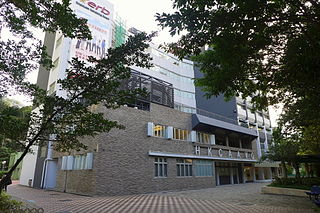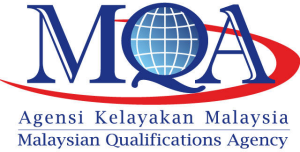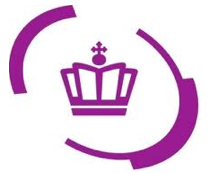Higher education in Mauritius includes colleges, universities and other technical institutions. Public university education has been free to students since 2019. The sector is managed by the Higher Education Commission (HEC) which has the responsibility for allocating public funds, and fostering, planning and coordinating the development of post-secondary education and training. Formerly the Tertiary Education Commission, in 2020 it was reformed into the HEC and a separate Quality Assurance Authority (QAA) for auditing of qualifications.

The Quality Assurance Agency for Higher Education is the United Kingdom higher education sector's independent expert quality body. It has a remit to maintain and enhance the quality of teaching and learning in tertiary education in the United Kingdom and beyond. It conducts quality assessment reviews, develops reference points and guidance for providers, and conducts or commissions research on relevant issues.
A national qualifications framework (NQF) is a formal system describing qualifications. 47 countries participating in the Bologna Process are committed to producing a national qualifications framework. Other countries not part of this process also have national qualifications frameworks.
Recognition of prior learning (RPL), prior learning assessment (PLA), or prior learning assessment and recognition (PLAR) describes a process used by regulatory bodies, adult learning centres, career development practitioners, military organizations, human resources professionals, employers, training institutions, colleges and universities around the world to evaluate skills and knowledge acquired outside the classroom for the purpose of recognizing competence against a given set of standards, competencies, or learning outcomes. RPL is practiced in many countries for a variety of purposes, for example an individual's standing in a profession, trades qualifications, academic achievement, recruitment, performance management, career and succession planning.

The Hong Kong Council for Accreditation of Academic and Vocational Qualifications (HKCAAVQ), (HKCAA) is a statutory body established under the HKCAAVQ Ordinance which came into effect on 1 October 2007.

The Accreditation Council for Business Schools and Programs (ACBSP), formerly the Association of Collegiate Business Schools and Programs, is a United States-based organization offering accreditation services to business programs focused on teaching and learning.
The British Accreditation Council (BAC), also known as The British Accreditation Council for Independent Further and Higher Education, is an educational accreditation agency recognised by the British Government for international students entering the United Kingdom on student visitor visas. The British Accreditation Council was established in 1984, making it the oldest national independent accrediting body for non-EFL independent further and higher education providers in the UK.
The Malaysian Qualifications Framework or the MQF is a unified system of post secondary qualifications offered on a national basis in Malaysia. It is administered by the Malaysian Qualifications Agency (MQA), a statutory body under the purview of the Ministry of Higher Education (MOHE).

The Malaysian Qualifications Agency is a statutory body in Malaysia set up under the Malaysian Qualifications Act 2007 to accredit academic programs provided by educational institutions providing post secondary or higher education and facilitate the accreditation and articulation of qualifications.

The Commission for Academic Accreditation (CAA) is the national quality assurance and regulatory agency responsible for evaluation and accreditation of higher educational institutions and universities in the United Arab Emirates. Established in 2000, it comes under the country's Ministry of Education.
EQANIE is a non-profit association seeking to enhance evaluation and quality assurance of informatics study programmes and education in Europe. It was founded on January 9, 2009 in Düsseldorf, Germany. EQANIE develops criteria and procedures for the evaluation and quality assurance in informatics study programmes and education. EQANIE awards the so-called Euro-Inf Quality Label to degree programmes that comply with the Euro-Inf Framework Standards and Accreditation Criteria. As of 2021, informatics study programmes from 21 different countries have been accredited.
Higher education accreditation is a type of quality assurance process under which services and operations of post-secondary educational institutions or programs are evaluated to determine if applicable standards are met. If standards are met, accredited status is granted by the agency.

The CTI Education Group (CTI) was a registered, private higher education institution in South Africa. Full-time and part-time students can study within the fields of Information Technology, Psychology & Counselling, Creative Arts & Graphic Design, Commerce and Law on campuses spread throughout South Africa.
The European Network for Accreditation of Engineering Education (ENAEE) was established in 2006 as an organization to promote quality in engineering education across Europe and beyond. It is rooted in the Bologna process which aims to build the European Higher Education Area.
Membership of ENAEE is open to all bodies concerned with educational and professional standards in engineering. Such bodies may include accreditation and quality assurance agencies, professional organisations, associations of higher education institutions, employers' associations, and engineering student bodies and their associations.

The Danish Accreditation Institution was established by Danish law as an independent institution in 2007. The institution consists of two entities; the Accreditation Council, which serves as the decision-making authority, and Accreditation Institution, which serves as the accreditation operator. The Council makes decisions on the accreditation of all higher education study programmes in Denmark, both new and existing.

The International Open University (IOU) is a private distance education university headquartered in Kanifing, The Gambia. It was founded by Bilal Philips, in 2007 and offers undergraduate and graduate degrees.
The Akkrediterungs-, Certifizierungs- und Qualitätssicherungs-Institut (ACQUIN) is a school accreditation system founded in the year 2001 as a consequence of the European Bologna process and the upcoming need for assuring the quality of newly introduced undergraduate and postgraduate degrees in Germany. ACQUIN is a member-based, non-profit organisation located in Bayreuth, Bavaria, Germany. The Institute operates under the licence of the German Accreditation Council and is thus empowered to award its quality seal to study programs which have successfully undergone accreditation. ACQUIN was reaccredited by the German Accreditation Council until 30 September 2011. ACQUIN operates internationally in several key regions, including the German-speaking European region, Middle and Eastern Europe and North Africa - Near and Middle East. Nowadays ACQUIN is an association of over 100 higher education institutions from Germany, Austria, Switzerland, Hungary and the United States of America. ACQUIN operates as a non-profit organisation which is financed through membership fees as well as through Higher Education Institutions for accreditation services provided.
Self-Financing Higher Education in Hong Kong refers to educational programmes at the sub-degree level and above provided by local self-financing entities. Since the government announced the target of enabling 60% of secondary school graduates to receive higher education, the self-financing post-secondary education sector has experienced significant expansion with the aim of accommodating the emerging needs of the society.
The Crown University International Chartered is a global private, research university in Santa Cruz Province, Argentina, South America, which offers professional vocational training and higher education. Founded in 2011, the university has partners in Ghana, Benin Republic, Togo, Nigeria, Liberia, India, Israel, Saudi Arabia and other associates worldwide. It serves as an autonomous global university, offering education and practical skill in the courses taught in its main campus at Santa Cruz and on-campus studies by 42 worldwide affiliated colleges in 22 countries. Some of academic partners are Bharat University in India, Mother Teresa University in India, University of Kara Republic of Togo and Shimla University India








